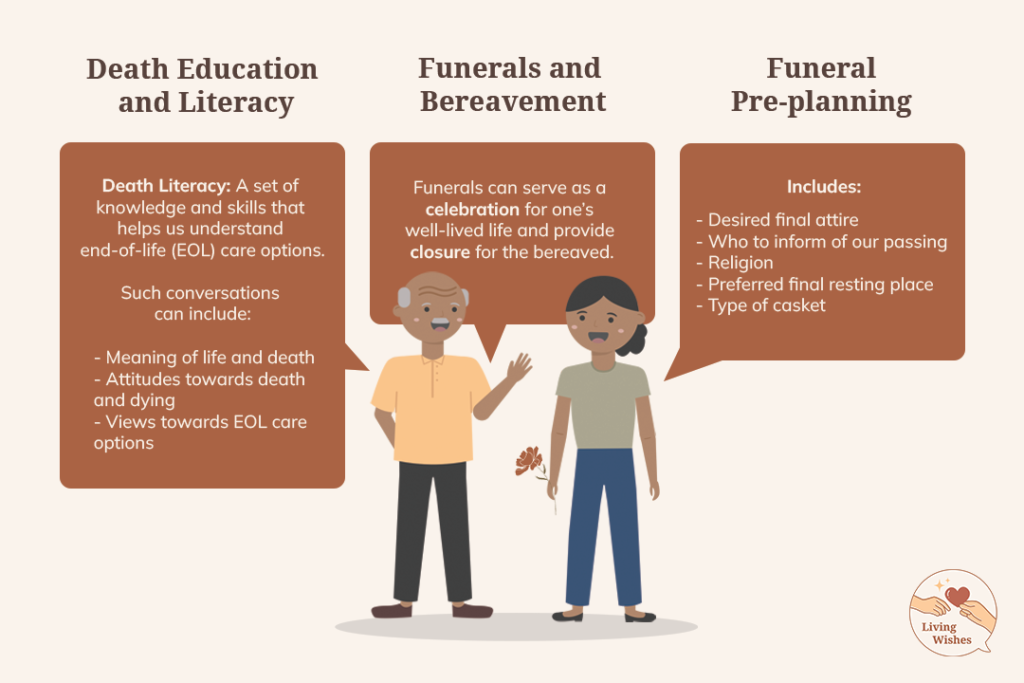Beyond ACP: Death and Funerals

We plan for our weddings, birthdays and anniversaries – why not for our deaths too? In Singapore, dying, death and funerals are treated as taboo topics. However, having open conversations about these subjects has its benefits, such as being able to plan ahead for unexpected situations.
Death Education and Literacy
Death literacy is a set of knowledge and skills that helps us understand end-of-life (EOL) care options. Since death is a natural and inevitable part of life, it’s important to engage in conversations about it early with our loved ones. This can involve talking about the meaning of life and death, our attitudes towards dying and death, or our views towards EOL care options. It is also crucial to start early EOL planning, which includes Advance Care Planning, Legacy Planning and Emotional Wills. Find out more in our previous blog post about EOL planning.
By normalising conversations about death, we can make more informed choices about our parents’ and our own EOL care, gain an appreciation towards life or even learn how to better cope with grief.
Funerals and Bereavement
While people tend to avoid funerals, they can serve as a celebration for one’s well-lived life and closure for the bereaved. Funerals bring family and friends together to recognise the impact of the deceased on our lives. They also allow us to say our final goodbyes and grieve collectively. In a sense, funerals are held for the living to continue living on.
By embracing, crying and laughing with people who share the same love for the deceased as us, we can take the first few steps through our grief and understand the loss that we have experienced. Those around us can help to validate our emotions, share stories about the deceased and comfort us with their presence – a testament that we are not alone in our grief.
Funeral Pre-planning
When one passes on, there are many decisions to be made especially with regards to the funeral. On top of the grief that remaining family members have to cope with, they will also be burdened with the responsibility of making funeral decisions on behalf of their loved ones. With individual differences in beliefs and religion, it can be challenging for family members to make a collective decision – or even one that the deceased would have wanted.
In a conversation with Mr Ang Zi Qian, founder of the Ang Chin Moh Foundation, he shared an anecdote of an elderly man who passed away from a heart attack. Due to conflicting opinions among the family on how his funeral should be conducted, the elderly man could not be brought to the Ang Chin Moh care centre immediately. Each of his children practised a different faith, which they believed to be the best for their father. It came to a point when one of them told the rest to ask their deceased father which religious rites to conduct for him, leaving their mother distressed and in tears.
This argument lasted six long hours – during which their deceased father was left lying on the cold floor of their living room.
“This incident got me thinking about how I can prevent this from happening to other families. Pre-planning is important to give both the dead and the living peace of mind. And it’s also why we started this journey of educating the community about the importance of EOL conversations,” Mr Ang said.
Funeral pre-planning can be done by making our funeral preferences known to our family. This includes our desired final attire, who to inform of our passing, religion, preferred final resting place and type of casket. Some of us may even have unique requests such as playing our favourite movie or hosting a karaoke session during our funeral. To help avoid any unexpected costs for our family or uncertainty over our final wishes, we can even get pre-paid funeral plans in advance.

Given the ageing population in Singapore, it is vital for us to begin conversations on dying, death and funerals with our loved ones. As future decision-makers for our parents, we need to be the ones to start such conversations and help them with EOL matters while they are still healthy and have the capacity to do so. Pre-planning our funerals gives not only our loved ones, but also ourselves peace of mind – knowing that our final wishes have been indicated to avoid unnecessary funeral costs. Get started on your EOL care plan with our list of end-of-life planning resources!